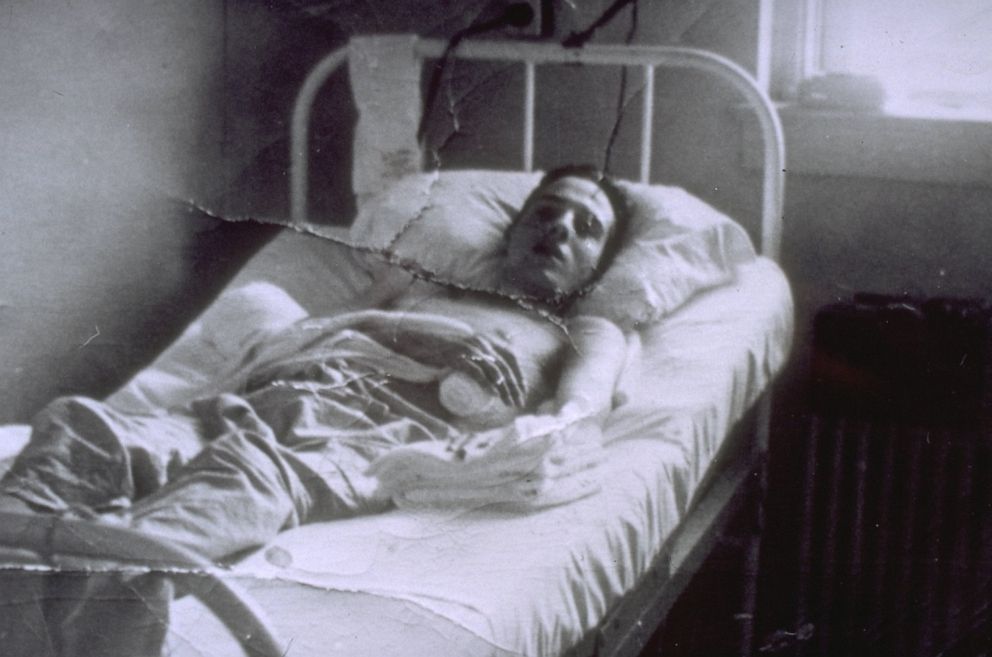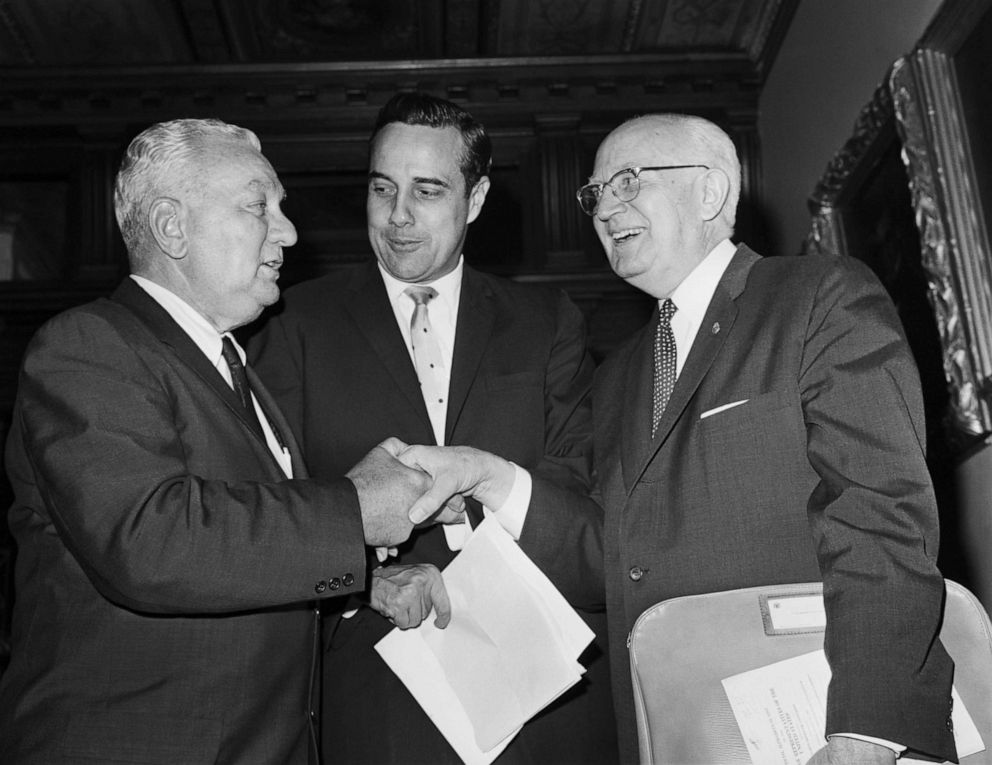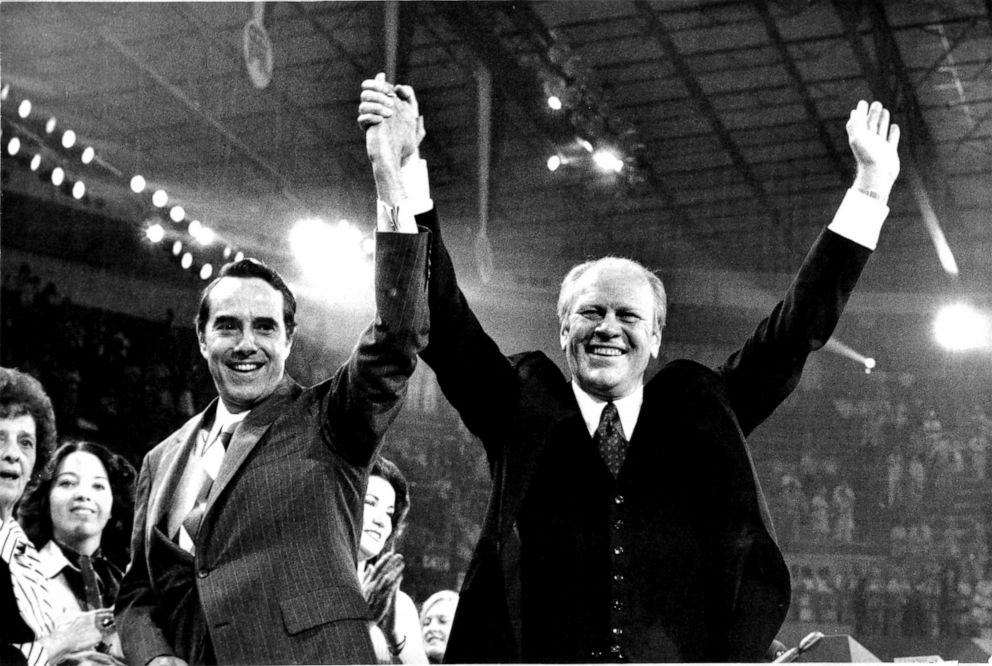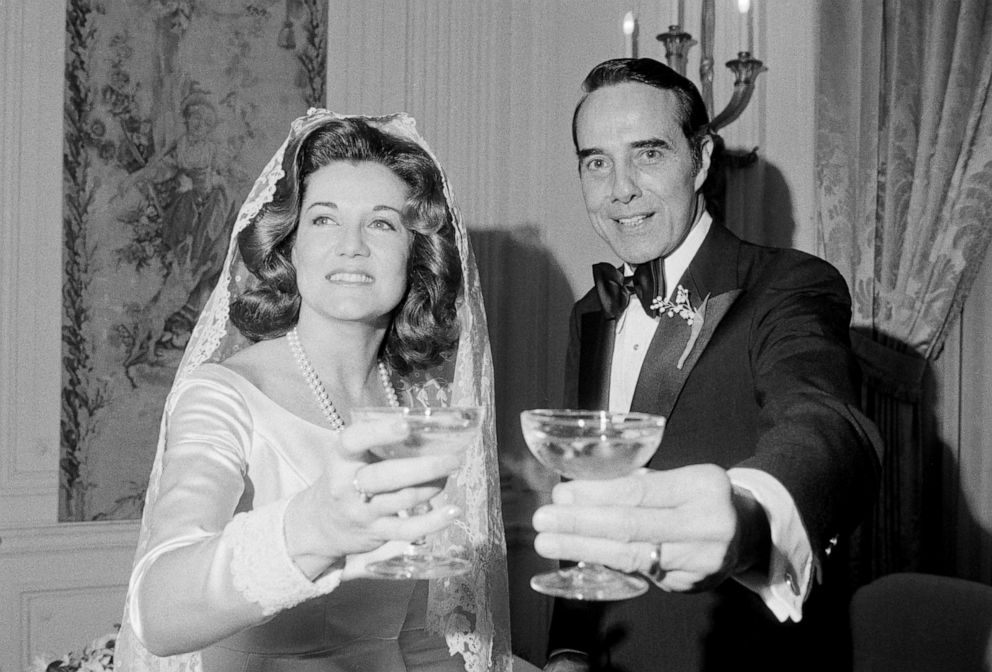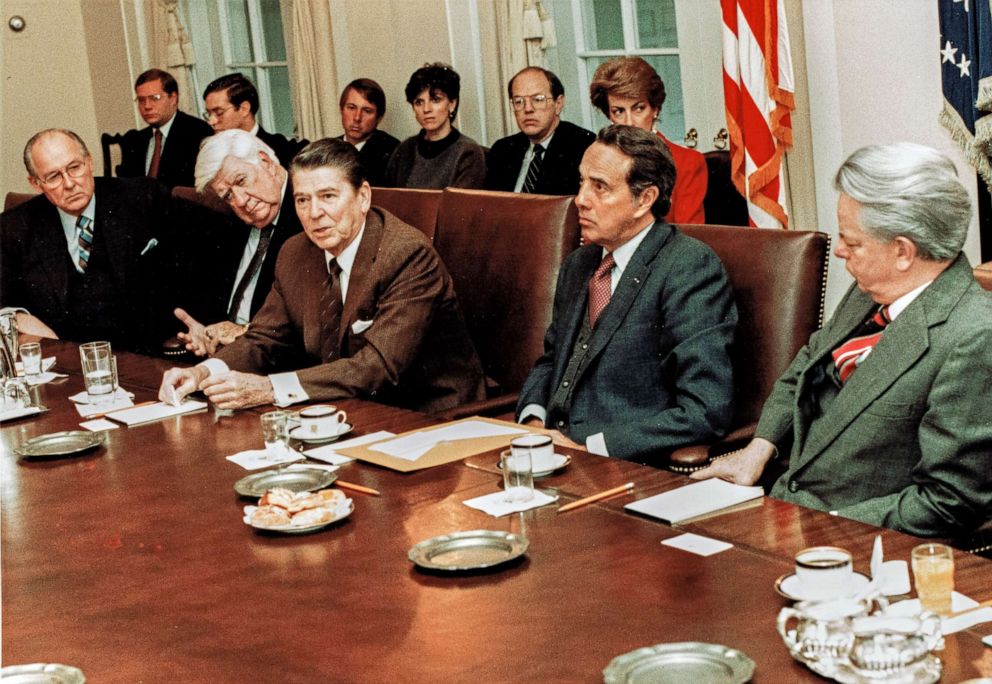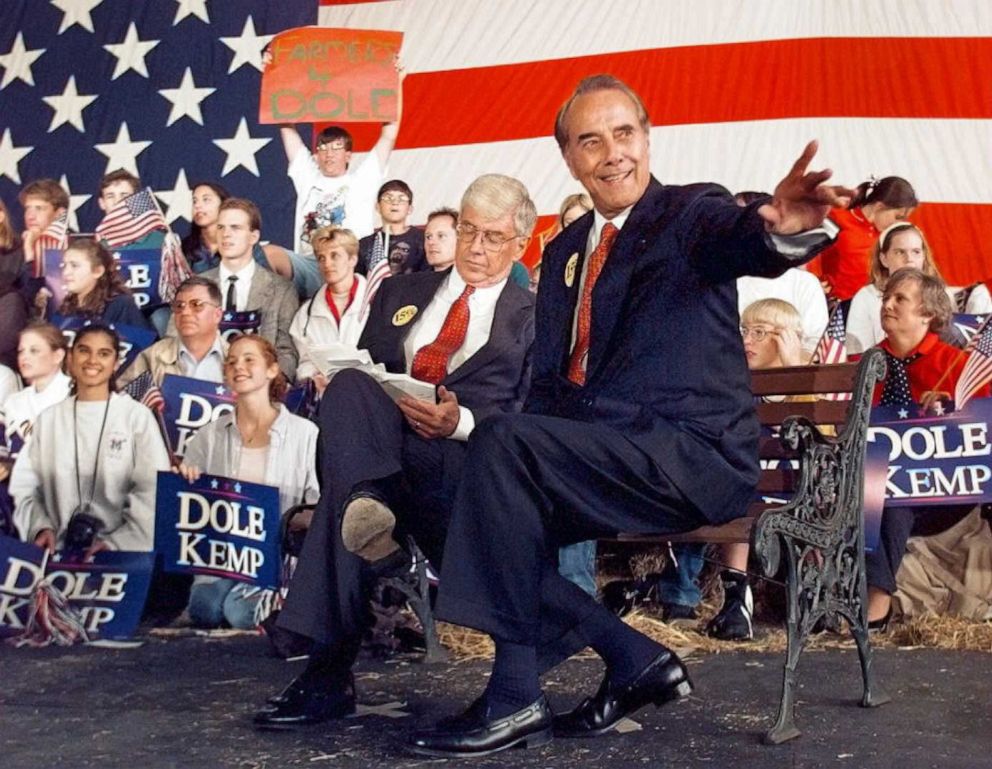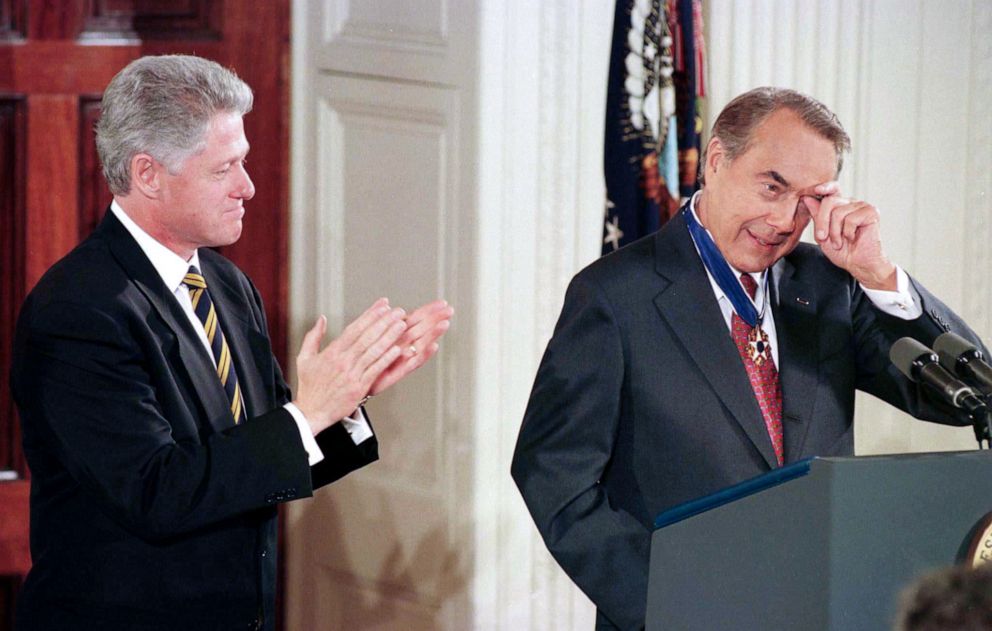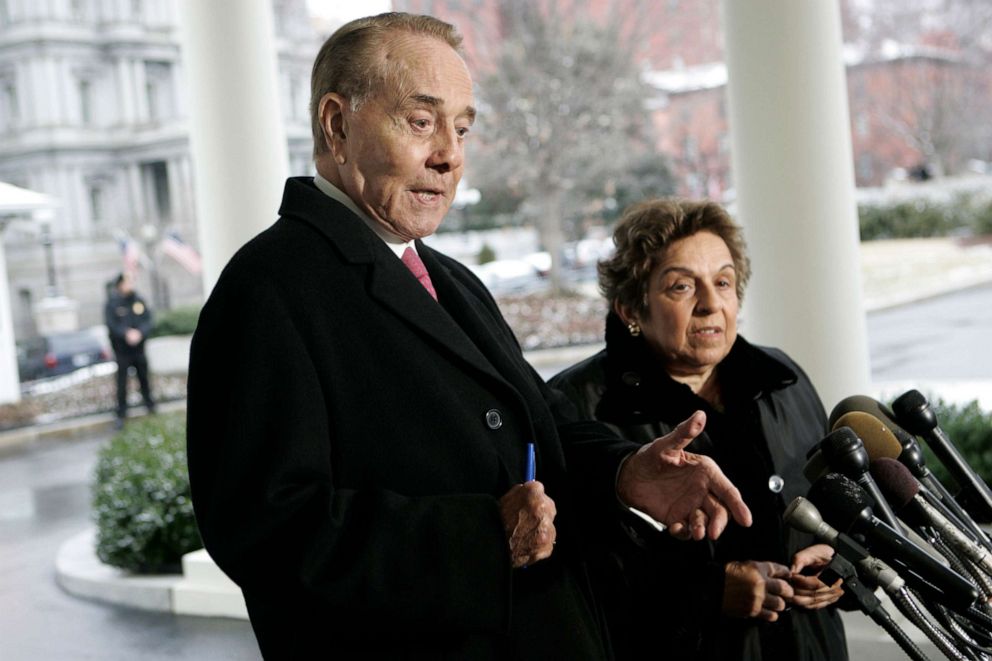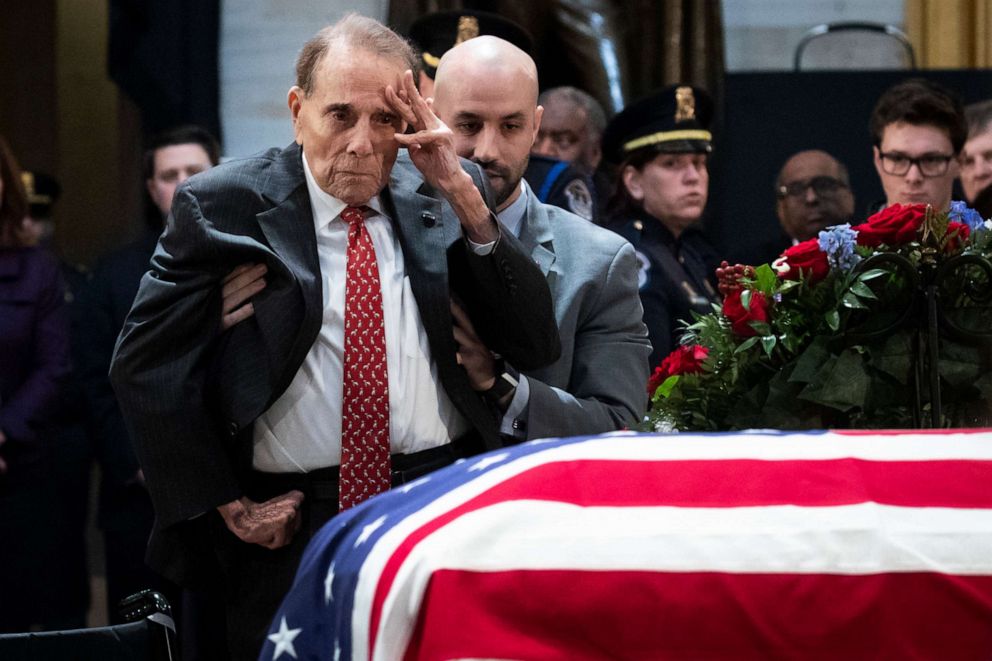Former Republican presidential nominee Bob Dole dies at age 98
The former GOP leader will be remembered for the tenacity that defined his career and his work on behalf of military veterans.

TOPEKA, Kan. -- Former U.S. Sen. Bob Dole, who will be remembered for the tenacity that defined his career and his work on behalf of fellow military veterans, died Sunday morning in his sleep. He was 98.
In his memoir, "One Soldier's Story," Dole wrote that his experiences in World War II defined his life.
"Adversity can be a harsh teacher," he wrote. "But its lessons often define our lives. As much as we may wish that we could go back and relive them, do things differently, make better, wiser decisions, we can't change history. War is like that. You can rewrite it, attempt to infuse it with your own personal opinions, twist or spin it to make it more palatable, but eventually the truth will come out."
As an Army officer in World War II, he was wounded and there were doubts he'd survive. His right arm was permanently disabled, but he adapted.
"If unable to reach voters with my right hand, I could always reach out with my left," he wrote in "The Doles: Unlimited Partners," a book he co-authored with his wife, Elizabeth, and Richard Norton Smith.
He went on to graduate from college, and, while still in law school, won a seat in the Kansas state legislature. He won a seat in Congress in 1960 and went on to serve in the House until he was elected to the Senate in 1968.
Dole ran three times for president. He lost in primaries in 1980 to Ronald Reagan and in 1988 to George H.W. Bush. He won the Republican party nomination in 1996, but lost the general election to Bill Clinton.

"Those pivotal moments remain indelibly impressed in your heart and mind," he wrote in "One Soldier's Story." "For me, the defining period in my life was not running for the highest office in the land. It started years earlier, in a foreign country, where hardly anyone knew my name."
'An All American Boy,' wartime service and wounds
Robert Dole was born in the small town of Russell, Kansas, on July 22, 1923.
His father, Doran, ran a local creamery, and his mother, Bina, occasionally sold Singer sewing machines door-to-door to make ends meet. He grew up with three siblings and, according to a timeline on the Dole Institute website, the four children shared a room, a bike and a pair of roller skates.
His neighbors recalled him growing up as "an all-American boy," according to his 1996 presidential campaign website. In school, he was an honor student, sports editor of his school newspaper and he lettered in football, basketball and track.
In 1941, he graduated from Russell High School and enrolled at the University of Kansas, becoming the first in his family to go to college -- thanks to a $300 loan from a Russell banker.
A year into college, the Japanese bombed Pearl Harbor. Dole left the university in 1943 to enroll in the Army. He had hoped to become a doctor and trained in the medical corps at Camp Barkley in Texas, according to a Dole Institute timeline. He later attended Army Officer Candidate School at Fort Benning in Georgia and, by the end of 1944, graduated as a second lieutenant in the Army infantry.
In 1945, Dole was assigned to the 85th Regime, 10th Mountain Division. It was originally intended to be a group of "skiing soldiers" to fight the Germans in the snow and mountains. But Dole was wounded during "Operation Craftsmen," a spring offensive in Italy that was meant to overtake German troops scattered in the hills and valleys of the Apennine Mountains and gain control of northern Italy.
Dole's platoon was to take Hill 913. His fellow soldiers later described it as a "suicide mission."
It was April, and a stone wall and a field of landmines trapped the Americans in an exposed area. A Nazi sniper, perched in a farmhouse, began firing at the battalion, according to Dole's 1996 campaign website. The platoon leader was ordered to take out the sniper and gunners. But as Dole climbed a rocky field, his radio man was hit.
Dole crawled across the battlefield on his stomach and then pulled the wounded soldier into a foxhole. Seconds later, an exploding shell ripped into Dole's right shoulder and back. His collarbone was shattered, part of his spine was smashed and his right arm was dangling from his side.
Lying facedown in the dirt, Dole recalled being unable to see or move his arms.
"I thought they were missing," he said on his campaign website. He called for help, and two medics who tried to rescue him were gunned down. A sergeant eventually dragged him to safety.
Dole earned two Purple Hearts and was awarded the Bronze Star, but doctors weren't sure he'd survive. He was hospitalized for three years. He suffered infections, grueling therapy, several operations and in one instance developed a blood clot that nearly killed him.
Good Samaritans helped him. A surgeon performed several of Dole's surgeries at no charge. Back home in Russell, the community collected money in a cigar box at the local drug store to help pay for his medical bills. Dole kept that cigar box, decades later, in his Senate office desk drawer.
He recovered sensation in most of his body and was able to walk, but his right arm was permanently disabled. He would often carry a pen in his right hand to prevent his fingers from splaying. He usually avoided shaking hands with his right hand.
"Coming back from a war is a longer journey than any plane flight home," Dole wrote in a 2006 forward to "Courage After Fire: Coping Strategies for Troops Returning from Iraq and Afghanistan and Their Families." "I sustained my own injuries in World War II; some of my wounds were obvious, some were not. Some wounds were healed more quickly than others. And though I was lucky to be surrounded by great doctors, wonderful family, and a more supportive community than anyone could reasonably ask for, that mental readjustment was no small task."
In 1948, while still recovering, he married Phyllis Holden, an occupational therapist from New Hampshire. They met during his last months of treatment at a hospital dance and married three months later.
His hopes of becoming a physician dashed, he set his sights on becoming a lawyer.
"Maybe I couldn't use my hand, I told myself, but I could develop my mind," he wrote in "The Doles: Unlimited Partners."
He first enrolled at the University of Arizona in Tucson on the GI Bill, and a year later transferred to Washburn University in his home state of Kansas. He graduated in 1952.
Senate leadership, presidential aspirations, a political power couple
Still in law school, Dole won his first election, claiming a seat in the Kansas House of Representatives. He served from 1951 to 1953, until he was elected Russell County Attorney.
His daughter, Robin, was born in 1954.
He served as county attorney until 1961, when he was first elected as a Republican to the 87th Congress.
His campaign events featured singers playing the ukulele and women referred to as "Dolls for Dole," who handed out cups of Dole pineapple juice, according to the Dole Institute. He served on the House Agriculture Committee after having pledged to support farmers' interests, such as promoting rural electricity and soil conservation.
In 1964, he voted in favor of the Civil Rights Act, and in 1965 voted in favor of the Voting Rights Act. He considered them to be the most important votes of his career.
He was elected to the U.S. Senate, defeating former Kansas Gov. Bill Avery, and served for 28 years, garnering national attention.
In the early 1970s, he served as the chairman of the Republican National Committee, including during the 1972 election and Watergate break-in. He lived at the Watergate at the time, and a hometown reporter asked whether he had hidden the break-in tools in his one-bedroom apartment, according to The New York Times. He said he did not.
Dole and Phyllis divorced in 1972. In 1976, she told an interviewer that much of what her former husband had achieved since the war was an effort to prove that he could do it in spite of his handicap, according to a 1982 profile in The New York Times.
He married Elizabeth Hanford in December 1975 in a ceremony at the Washington National Cathedral.
In 1976, then-President Gerald Ford selected Dole as his running mate at the Republican National Convention. And at the end of the decade, Dole made a brief run for president in the Republican primary, but withdrew after a lackluster showing in New Hampshire.
Dole went on to serve as chairman of the Senate Finance Committee from 1981 to 1985. He served as the Republican leader from 1985 to 1996. In the midst of his leadership role, he ran for president again. This time, he scored an upset over then-Vice President George H.W. Bush in Iowa, but fell short again in New Hampshire in 1988, withdrawing from the race.
Elizabeth Dole became labor secretary under Bush. In 1991, she left her Cabinet position to become the president of the American Red Cross. From 1983 to 1987, Elizabeth Dole, under President Ronald Reagan, had become the first woman to serve as secretary for the Department of Transportation and the first woman to lead a branch of the armed services, the Coast Guard.
In 1996, Dole retired from the Senate to fully pursue the presidency. This time, he secured the Republican nomination and, with former Secretary of Housing and Urban Development and U.S. Rep. Jack Kemp, challenged President Bill Clinton.
"When I delivered my concession speech that evening, I meant it when I said, 'Tomorrow is the first day of my life when I have nothing to do,'" Dole wrote in "Great Political Wit: Laughing (Almost) All the Way to the White House."
He was wrong. He went to his Washington campaign office to personally thank his staff and volunteers. While there, he got a call from the producers of "The Late Show with David Letterman" asking if he'd be a guest on their show while they broadcasted from Washington.
Two nights later, he recalled trading quips with Letterman when he asked Dole about Clinton's weight.
"'I don't know,' was my comeback. 'I never tried to lift him. I just tried to beat him,'" Dole wrote, then describing the audience's laughter. "Pundits, ever quick to grasp the obvious, claimed to have discovered a New Dole."
He was no longer the "glowering, Social Security-devouring sourpuss they'd come to know," he wrote. He made appearances on "The Tonight Show with Jay Leno," "Saturday Night Live" and filmed a Visa commercial that premiered during the 1997 Super Bowl. In it, he returned to his hometown to be asked by the diner's waitress for identification before he could cash a check.
"I just can't win," he said in the advertisement.
In his book, he wrote, "Over the years I've grown ever more convinced that my hero, Dwight Eisenhower, was absolutely right when he said, 'A sense of humor is part of the art of leadership, of getting along with people, of getting things done.'"
As Dole settled into a post-political life, Elizabeth Dole returned to politics.
She sought the Republican nomination for president before exiting the race in October 1999. Then in 2002, when longtime Sen. Jesse Helms announced his retirement, she decided to run for his seat and became the state's first female senator. She served one term before being defeated in her reelection bid in 2008.
Post-political life, continued service to veterans
In 1997, months after losing the presidential election, Clinton presented Dole with the Presidential Medal of Freedom.
"Through it, we honor not just his individual achievement but his clear embodiment in the common values and beliefs that join us as a people," Clinton said ahead of placing the medal around his neck. "Values and beliefs that he has spent his life advancing. Sen. Dole, a grateful nation presents this award, with respect for the example you have set for Americans today and for Americans and generations yet to come."
After accepting the medal, Dole said, "No one can claim to be equal to this honor, but I will cherish it as long as I live because this occasion allows me to honor others who are more entitled."
Dole went on to lead the World War II Memorial Commission. As national chairman, he helped to raise more than $197 million to construct a national memorial to honor the 16 million Americans who served in the armed forces during the war. Construction began in September 2001 and was completed in April 2004.
At the dedication ceremony, Dole spoke about the importance of remembering the sacrifices made to uphold democracy.
"It is only fitting when this memorial was opened to the public about a month ago the very first visitors were schoolchildren," Dole said. "For them, our war is ancient history and those who fought it are slightly ancient themselves. Yet, in the end, they are the ones for whom we built this shrine and to whom we now hand the baton in the unending relay of human possibility."
In addition to his Visa commercial, Dole went on to pitch for Dunkin' Donuts, Pepsi and Viagra. His good humor also won him a place on Comedy Central, where he supplied commentary on "The Daily Show" during the 2000 election. And ground was broken for the Robert J. Dole Institute of Politics at the University of Kansas in Lawrence in 1997 and dedicated in 2003.
But his work with and for veterans is something he notably continued into his later years. Elizabeth Dole began to work in support of military caregivers.
He served as honorary adviser of the Honor Flight Network, which works to provide veterans the opportunity to visit the World War II Memorial in Washington for free. Dole would often spend Saturdays at the memorial, greeting veterans, swapping stories and posing for photos.
In 2007, President George W. Bush appointed Dole to help lead a bipartisan commission to investigate a neglect scandal at Walter Reed Army Medical Center. Elizabeth Dole, in 2012, established the Elizabeth Dole Foundation, which was designed to empower, support and honor the nation's 5.5 million military caregivers.
Dole embarked on a reunion tour of his home state, visiting all 105 counties, in his early 90s. And in 2017, at the age of 94, he returned to Fort Benning, from which he'd graduated from Army Officer Candidate School in 1944.
On his Twitter account, he posted that he hadn't been there since he graduated. "Jiminy!" he wrote, posting a photo of him sitting on a plane.
On Dec. 4, 2018, Dole made headlines celebrating a fellow veteran. He visited the U.S. Capitol Rotunda and was helped out of his wheelchair so that he could stand and salute the casket of George H.W. Bush.
Two days later, the Doles celebrated their 43rd wedding anniversary.
In April 2019, President Donald Trump signed into law a bill authorizing Dole's honorary promotion to colonel.
"He turned adversity into action as he healed from the grave wounds sustained while risking his life for a fellow soldier, and decided to come to Congress and to serve the people of Kansas," Rep. Nancy Pelosi said in January 2018 at a ceremony granting Dole the Congressional Gold Medal. "Sen. Bob Dole, for a lifetime spent defending, advancing and exemplifying our proudest American ideals, we thank you."
ABC News' Roey Hadar and Benjamin Siu contributed to this report.



